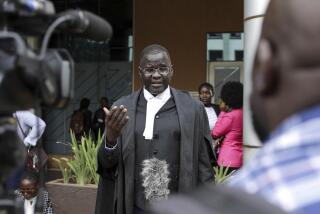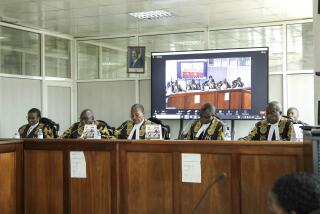Ban on enforcement of ‘don’t ask, don’t tell’ policy is suspended
A federal appeals court late Friday temporarily suspended its ban on enforcement of the military’s “don’t ask, don’t tell” policy, reversing course for the second time this month on how and when the Pentagon must stop discharging gay soldiers and sailors.
The Justice Department had argued in a motion filed Thursday with the U.S. 9th Circuit Court of Appeals that congressional action last year setting out a path toward eventual repeal of “don’t ask, don’t tell” should be allowed to run its course without intervention from the courts.
The orderly transition crafted by Congress, the government said, ensures that the decision to integrate openly gay people into the armed forces is “the product of the military’s own, informed choices … rather than the product of a judicial order.”
It cited U.S. Supreme Court rulings that courts should refrain from interfering with actions by Congress “under its authority to raise and support armies.”
The 9th Circuit’s order Friday simply holds up enforcement of its July 6 decision that gays should no longer be vulnerable to dismissal from service until the court can hear arguments next week on why the policy should remain in force until repeal is complete, likely by the end of the year.
The July 6 ruling came after the Obama administration called for “heightened scrutiny” of laws targeting sexual orientation.
The 1993 statute mandating discharge of openly gay service members effectively forced gays to hide their sexual orientation if they wanted to serve their country. The policy was ruled unconstitutional in September, and a month later U.S. District Judge Virginia Phillips in Riverside issued a “worldwide injunction” against further discharges of gay service members. The 9th Circuit suspended her order in November while the government appealed her ruling.
Congress, in the meantime, passed the Don’t Ask, Don’t Tell Repeal Act, which left the ban on gays and lesbians in the military in force during a transition period to prepare the armed forces for integration. The legislation makes repeal effective 60 days after the president, the Defense secretary and the Joint Chiefs of Staff have certified that repeal wouldn’t damage military readiness, effectiveness, unit cohesion or recruiting and retention.
The government request for another suspension of Phillips’ order noted that the Pentagon expects to be ready for review of its preparations by late July or early August. The government also pointed out in its legal papers that only one soldier has been discharged under “don’t ask, don’t tell” since the Repeal Act was passed.
Still, Log Cabin Republicans, the gay rights group that brought suit against “don’t ask, don’t tell” seven years ago, had urged the court to let Phillips’ injunction take force, saying that the “on-again, off-again status of the district court’s injunction benefits no one and plays havoc with the constitutional rights of American service members.”
More to Read
Start your day right
Sign up for Essential California for news, features and recommendations from the L.A. Times and beyond in your inbox six days a week.
You may occasionally receive promotional content from the Los Angeles Times.







